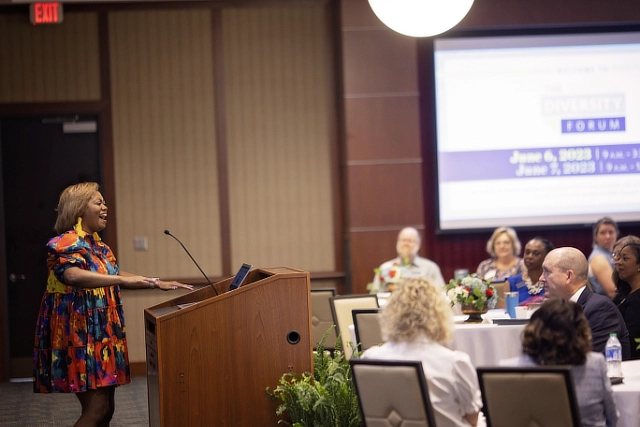
Orlean Beeson School of Education, in partnership with the Office of Diversity and Intercultural Initiatives, hosted its second Diversity Forum June 6-7.
The Diversity Forum, the brainchild of Anna McEwan, dean of the school of education, and Monique Witherspoon, associate dean, exists to provide P-12 and higher education professionals, community leaders and others with the skills they need to build diverse learning communities. The two-day conference featured a wide variety of speakers and breakout sessions, collaborative discussions, growth and learning opportunities surrounding diversity, equity and inclusion.
Jane Cobia, professor and director of the school of education’s doctoral program, is one of several faculty members who made this conference possible.
“This year’s conference was a bit different than our inaugural forum,” said Cobia. “In the past year we have been doing research, we have looked at changing demographics, not just at Samford, but across the field of education in public and private schools. So, what we have attempted to do is greater outreach; this year we have greater diversity in our topics and in our speakers. We are thrilled to bring these different perspectives and motivations to the table so that we may continue to bring awareness, interest and opportunities for our guests.”
The conference kicked off with a powerful musical performance by Netra Blanch, followed by greetings from Samford leadership.
“For far too long, in our country, minoritized individuals have not benefitted from the full array of quality educational goods offered throughout the educational lifespan,” said Samford President, Beck A. Taylor, “Here at Samford we are committed not just to thinking well about these important opportunity gaps and their resulting achievement gaps, but also to equipping educators of the future to address these issues head on. Similarly, at the university level, Samford has adopted a comprehensive Diversity Action Plan that seeks nothing less than to ensure all students and employees flourish in their respective roles regardless of race, class or gender.”
Taylor summed up the reasons why Samford University and those attending the Diversity Forum are committed to engaging in these critically important dialogues in the following four points:
- Opportunities and achievement gaps must be addressed to give all children and all students the opportunities to flourish in educational environments. Research demonstrates that achievement disparities can persist well into early adulthood and impact employment outcomes, health status and other important lifetime metrics.
- Educational environments benefit when historically underrepresented people and voices are included in educational spaces and curriculum. Participants who reflect a more diverse composition, students of color and females, for example, benefit from seeing teachers and leaders who share their own experiences; majority students also benefit tremendously from these opportunities.
- Economically, institutions like Samford University that depend on tuition revenue and state funding to fund activities face a dramatically changing clientele due to shifting demographics. Institutions that are intentional about addressing diversity, equity and inclusion issues, that strive to create inclusive environments, that serve more diverse populations and are aggressive in chasing these issues will survive and flourish.
- Because Samford is a Christ-centered university, leadership offers this fourth justification for thinking and acting around diversity, that such work is central to the gospel of Jesus Christ and the gospel-oriented mission of Samford University where the love of Christ and Christ’s justice are shown to all people.
Following welcome remarks, Orlean Beeson School of Education’s Diversity Award was presented to Theresa Davidson, professor and director of Samford’s sociology program and Race, Ethnicity and Social Justice minor. Denise Gregory, associate provost for student success and diversity and inclusion, and McEwan presented the award which is given each year to someone who is doing distinctive work in the area of diversity.
Davidson’s teaching, work and research on topics of race, systematic inequality and social justice was instrumental in the development of Samford’s new Race, Ethnicity and Social Justice minor. Davidson demonstrates her commitment to diversity, equity and inclusion daily in the classroom and was the recipient for the 2017-18 Dean’s Award for Outstanding Teaching in Howard College of Arts and Sciences. In 2020, she received a grant which has since been expanded as a resource for Samford faculty to improve their teaching ability for all students.
The conference continued through the following day with several breakout sessions and keynote addresses.
On June 6, the keynote panel, “Latinos in Alabama: What and Why of Connecting with our Latino Neighbors,” was moderated by Carlos Javier Torres, ¡HICA! programs director. On June 7, the keynote address, “What Happens When We All Care and Advocate?: Teaching for Equality in Tough Times,” was presented by Tonya B. Perry, vice provost and professor at Miles College.
To learn more about the Diversity Forum and the different learning opportunities available at this conference, view the schedule of events.
